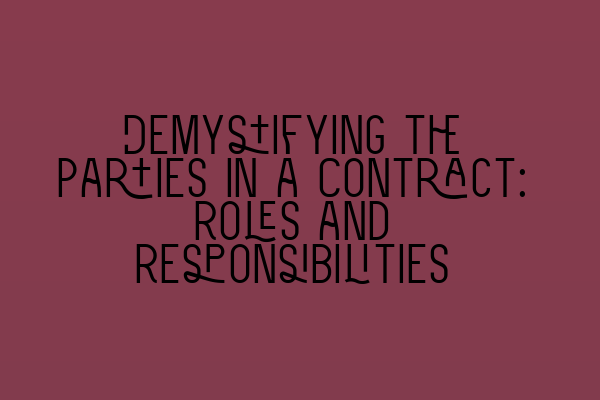Demystifying the Parties in a Contract: Roles and Responsibilities
Contracts are an integral part of any legal transaction. They provide a framework for parties to agree upon their rights, obligations, and responsibilities. Understanding the roles and responsibilities of the parties involved in a contract is crucial for ensuring smooth execution and avoiding disputes. In this article, we will demystify the parties in a contract, shedding light on their individual roles and responsibilities.
The Parties Involved
In a typical contract, there are two main parties: the offeror and the offeree. The offeror is the party who initiates the contract by making an offer to the other party, known as the offeree. These two parties are essential players in the contract, and their roles are defined by their respective positions.
The Offeror
The offeror is the party who presents the contract terms and conditions to the offeree. They have the responsibility of clearly stating the offer and its terms. The offeror must also ensure that the offer is communicated effectively to the offeree.
As an offeror, it is crucial to understand the law surrounding contract formation. This knowledge will enable you to create a valid offer that includes all necessary elements.
To gain a comprehensive understanding of contract law and its application, consider enrolling in SQE 1 preparation courses. These courses provide a solid foundation in contract law and cover all essential topics that will assist you in drafting effective offers.
The Offeree
The offeree is the party to whom the offer is made. They have the choice to accept or reject the offer presented by the offeror. If the offeree decides to accept the offer, a legally binding contract is formed between the parties.
When considering an offer, it is essential for the offeree to assess the terms and conditions thoroughly. This ensures that they fully understand their rights and responsibilities before entering into the contract.
In order to prepare for the legal profession, including contract negotiations, it is advisable to practice with SQE 1 practice exam questions and SQE 1 practice mocks FLK1 FLK2. These resources will help develop your skills in analyzing and evaluating contract terms.
Responsibilities of the Parties
Each party involved in a contract has specific responsibilities. These responsibilities are based on their roles as either the offeror or the offeree. Let’s explore the duties and obligations of each party in detail:
Offeror’s Responsibilities
– Clearly state the offer: The offeror must express their offer in clear and unambiguous terms. This ensures that the offeree understands the proposal without any confusion or misinterpretation.
– Include essential terms: The offeror must include all essential terms in the offer, such as price, quantity, and timeframe. These terms form the basis of the contract and must be stated explicitly.
– Communicate the offer effectively: The offer needs to be properly communicated to the offeree. For example, sending the offer through registered mail or email with a read receipt can help establish effective communication.
– Revocation of the offer: The offeror has the right to revoke the offer at any time before it is accepted by the offeree. However, once the offeree accepts the offer, it becomes binding, and the offeror cannot revoke it without consequences.
Offeree’s Responsibilities
– Thoroughly review the offer: The offeree has the responsibility to carefully read and understand the terms of the offer. They should seek clarification on any ambiguous or unclear provisions before accepting the offer.
– Acceptance of the offer: If the offeree decides to accept the offer, they must communicate their acceptance to the offeror in the manner specified in the offer. It is important for the offeree to meet any specified deadlines for acceptance.
– Counteroffer: In some cases, the offeree may propose modifications to the original offer, creating a counteroffer. A counteroffer acts as a rejection of the initial offer and presents new terms for the offeror to consider.
To enhance your knowledge of contract law, including the intricacies of offer and acceptance, consider enrolling in SQE 2 preparation courses. These courses provide comprehensive coverage of contract law, equipping you with the necessary skills to navigate complex contractual situations.
Conclusion
In a contract, the roles and responsibilities of the parties are critical for establishing a mutual understanding and ensuring a smooth execution. The offeror is responsible for making a clear and unambiguous offer, while the offeree must carefully review the terms before accepting or proposing modifications.
By understanding the duties and obligations of each party, potential disputes can be minimized, ultimately leading to successful contract outcomes. Aspiring legal professionals can benefit from comprehensive SRA SQE exam dates and preparation courses in building a strong foundation in contract law and its practical application.
